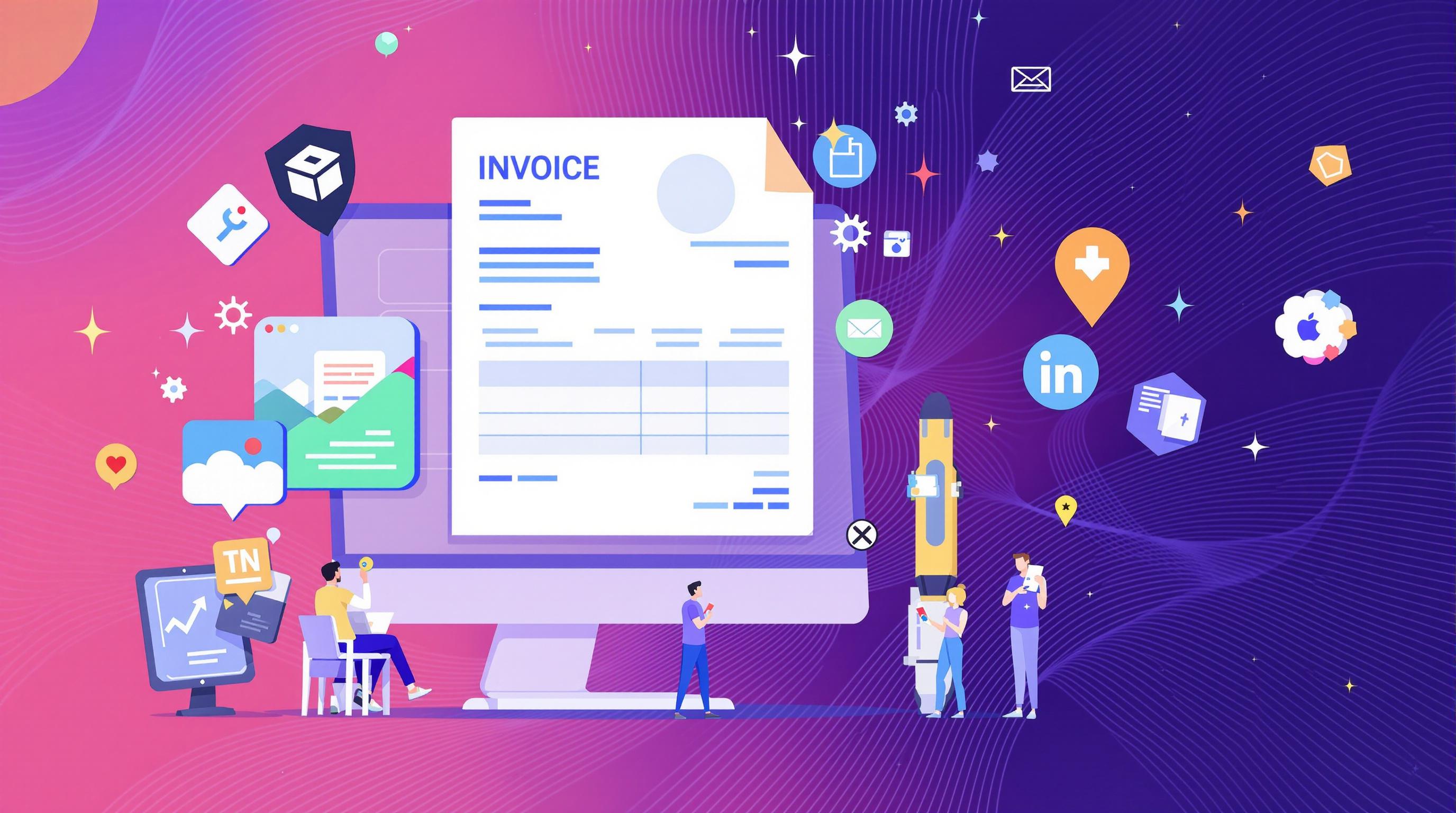Related Articles
- How Emotional Spending Biases in Leadership Can Influence Company Financial Transparency and Accountability
- Unveiling the Role of Employee Psychology in Shaping Unexpected Business Budget Outcomes
- Top 6 Disruptive Invoice Platforms Launched Since 2019 Tackling Automation Bottlenecks in Unconventional Ways
- Top 6 Smart Accounting Softwares Since 2019 That Revolutionize Tracking Business Tax Write-Offs
- The Rise of Biometric Authentication in Digital Finance: A New Frontier for Secure Business Transactions
- How Small Nonprofits Leverage Alternative Finance Tools to Navigate Accounting Challenges Off the Radar
5 Game-Changing Behavioral Insights Unlocking Smarter Invoice Automation Strategies Across Industries
5 Game-Changing Behavioral Insights Unlocking Smarter Invoice Automation Strategies Across Industries
5 Game-Changing Behavioral Insights Unlocking Smarter Invoice Automation Strategies Across Industries
1. The Psychology Behind Payment Delays
Understanding why businesses often delay payments is crucial for refining invoice automation. Behavioral economics reveals that delayed payments are frequently less about liquidity and more about cognitive overload and prioritization. When businesses juggle numerous invoices, the mental burden makes it easier to postpone payment decisions.
Invoice automation systems that incorporate reminders designed around human cognitive patterns achieve higher on-time payment rates. For example, sending staggered reminders that gently escalate urgency aligns better with behavioral tendencies rather than a single generic notification.
Research from the Journal of Behavioral Finance supports this, indicating that timely, context-specific nudges reduce late payments by up to 30%. Applying these insights helps industries tailor automation strategies to actual human behavior, not just transactional efficiency.
2. Trust Dynamics in Vendor-Customer Relationships
Invoice automation must consider trust factors influencing payment behaviors. Customers who feel valued by vendors are more likely to pay promptly, even if the payment process is complex. Building this trust online involves transparent communication and responsiveness integrated into the automation workflow.
Smart automation platforms now embed interactive client portals with real-time invoice status and immediate support features. This approach taps into psychological drivers of accountability and reciprocity, fostering a cooperative payment culture.
Harvard Business Review emphasizes that behavioral trust is a critical element in financial transactions. Incorporating trust-building elements directly into automated invoicing strengthens vendor-customer bonds and encourages on-time payments across sectors.
3. Personalization through Behavioral Segmentation
One-size-fits-all is dead in payment processing. Invoice automation systems leverage behavioral segmentation to customize interactions based on payment history, industry norms, and client communication preferences. Delivering tailored messages resonates more deeply with payers.
For instance, high-touch clients may receive detailed invoice explanations and direct human contact options, whereas low-touch accounts receive quick, automated reminders. This behavioral targeting enhances engagement and reduces friction.
A case study from McKinsey reveals companies employing behavioral segmentation achieve a 25% improvement in accounts receivable turnover. By understanding diverse payment personas, industries unlock smarter automation strategies that speak the language of their clients.
4. The Role of Social Proof in Payment Compliance
Social proof isn’t just marketing jargon—it’s a powerful behavioral tool in invoice automation. Displaying payment statistics or testimonials from other customers can nudge delayed payers to settle invoices faster, driven by a subconscious desire to conform.
Automation platforms embedding social proof elements, such as "90% of our clients pay within 7 days," create subtle peer pressure. This strategy capitalizes on norm-following behavior widely studied in social psychology.
According to research published in the Journal of Consumer Research, such normative messaging can increase compliance rates significantly. Across industries, leveraging social proof within automation not only optimizes payments but also boosts overall client satisfaction.
5. Simplifying Cognitive Load to Speed Payments
Complex invoices and convoluted payment procedures elevate cognitive load, causing delays. Behavioral science teaches that reducing this mental effort leads to quicker decision-making and actions. Streamlined automation interfaces that present clear, concise invoice data aid faster payments.
Features like summarized billing, visual progress trackers, and one-click payment options minimize cognitive friction. By applying principles from cognitive psychology directly into invoice automation design, companies reduce avoidance and procrastination behaviors.
Studies from Stanford University’s design lab confirm that simplification in digital financial tools accelerates user response times by over 40%. The cross-industry adoption of such behavioral insights demonstrates the direct ROI for smarter automation strategies.
6. Behavioral Timing: When to Send Automated Reminders
Timing is everything in behavioral nudges for invoicing. Automated reminders sent at the right moment in the payer’s workflow or decision cycle see markedly better results than those arbitrarily scheduled.
Invoice automation systems now employ AI to analyze payment patterns and trigger notifications precisely when recipients are most receptive. This data-driven, behaviorally aware timing increases payment likelihood.
A report from Deloitte highlights that dynamic timing analytics can boost payment rates by 20%. Industries implementing this behavioral insight outperform competitors by aligning automation with human temporal sensitivities.
7. Emotional Design Elements in Invoice Interfaces
Behaviorally smart invoice automation goes beyond function—it integrates emotional design principles. Color psychology, tone of language, and empathetic messaging reduce stress and resistance associated with paying bills.
Soft colors, positive language framing ("Your support helps us grow"), and personalized thank-you notes embedded in automated invoices foster goodwill. This reduces the negative emotions commonly hindering timely payment.
According to Nielsen Norman Group, emotionally resonant design increases user engagement and cooperation. Deploying these elements in invoice automation taps into subconscious decision-making, transforming a transactional task into a positive experience.
8. Gamification as a Behavioral Incentive
Gamification introduces reward systems and progress tracking to motivate faster payments. Behavioral psychology identifies positive reinforcement as a key driver of repeated desirable actions, including timely invoice settlements.
Some invoice automation platforms incorporate points, badges, or discount unlocks for early payments. These behavioral motivators change the mundane payment process into a goal-oriented experience.
A recent study in the International Journal of Information Management found gamified financial tools increase user compliance by nearly 35%. Across industries, gamification represents a novel behavioral insight reshaping smarter invoice automation.
9. Overcoming Loss Aversion with Payment Framing
People are more motivated to avoid losses than to secure gains—a fundamental law of behavioral economics. Invoice automation that frames payments in terms of loss avoidance (e.g., "Avoid late fees by paying now") taps into this psychological trigger.
The way costs and deadlines are presented within the automation interface influences urgency and compliance. Language that highlights potential losses rather than just benefits motivates quicker action.
Behavioral studies including Kahneman and Tversky’s Prospect Theory affirm that loss-framed messaging outperforms gain-framed in payment contexts. This insight empowers industries to engineer invoice automation that aligns with deep-rooted human behavior.
10. Continuous Behavioral Feedback Loops for Improvement
Behaviorally savvy invoice automation doesn’t stop at deployment—it incorporates feedback loops that monitor human responses and adapt strategies accordingly. Continuous learning about payer behavior refines messaging, timing, and interface elements in real time.
By tracking behavioral KPIs, companies personalize automation at scale and discover new levers to increase efficiency. This data-driven behavioral approach ensures evolving payers’ needs remain front and center.
MIT Sloan Management Review highlights that adaptive feedback loops in financial automation substantially enhance performance outcomes. Across industries, embracing this behavioral insight fosters smarter, more responsive invoice automation strategies.




